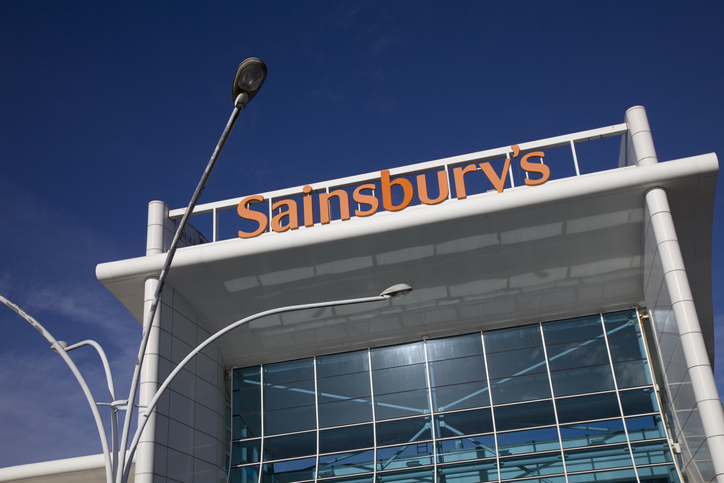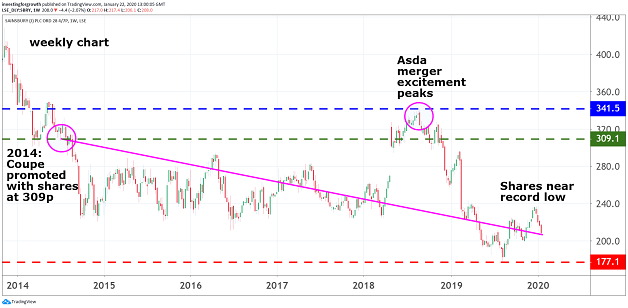Sainsbury’s gets new boss, but will he succeed?
After six mostly miserable years, shareholders hope a new chief will revive the struggling grocer.
22nd January 2020 13:12
by Graeme Evans from interactive investor
After six mostly miserable years, shareholders hope a new chief will revive the struggling grocer.

Mike Coupe leaves Sainsbury's (LSE:SBRY) this summer with few of the shareholder plaudits offered to Tesco “saviour” Dave Lewis, who announced his shock exit back in October.
Coupe has been at the helm since July 2014, but in that time Sainsbury’s shares have fallen by a third and total shareholder returns are down by 13.4%. The FTSE 100 stock declined 13% in 2019, which includes a sharp fall in February after regulators scuppered a takeover of Asda.
- Why Tesco is the best supermarket stock right now
- ii Super 60 investments: Quality options for your portfolio, rigorously selected by our impartial experts
The failure of this career-defining deal means today's announcement that Coupe will retire from Sainsbury's comes as little surprise in the City, despite the CEO's recent attempts to set out a standalone future for the UK's second-biggest supermarket chain.
He will be replaced at the start of June by Simon Roberts, who is currently retail and operations director. Like Ken Murphy, who takes over from Lewis at Tesco in the summer, Roberts's CV features a lengthy spell at Walgreen Boots Alliance, where he was president of Boots UK.

Source: TradingView Past performance is not a guide to future performance
Near the top of his in-tray will be to convince investors of the merits of Coupe's “multi brand, multi channel business” strategy, which includes a plan to reduce costs by £500 million over five years. In the face of structural competition from the German discounters, he will also need to show continued improvements in grocery value and greater customer satisfaction.
The store estate is also being restructured, with Argos stores being moved into supermarkets alongside a focus on the roll-out of more convenience-led outlets. So far, Coupe's plans, announced at a capital markets day in late September, have failed to inspire the moribund Sainsbury's share price, with the stock sharply lower so far in 2020.
Trading on a forward price/earnings multiple of 11 times, Sainsbury's is comfortably the cheapest of the three listed supermarkets. This compares with Morrisons (LSE:MRW) and Tesco (LSE:TSCO) at 14.3x and 14.6x respectively, and despite the added attraction of a dividend yielding close to 5%.
- Sainsbury's dramatic share price recovery stalls
- Take control of your retirement planning with our award-winning, low-cost Self-Invested Personal Pension (SIPP)
Today's change at the top did little to inspire interest in these metrics, with Sainsbury's down 2% to 207p and not far from the record low seen in August. Morgan Stanley said investors arguing for a more aggressive approach to the company's challenges may now hope that new leadership will potentially lead to further measures being taken.
Coupe always had a tough act to follow in Justin King, whom he had worked alongside in reviving the fortunes of the once struggling supermarket chain.
His tenure will be remembered for the ill-fated £7.3 billion deal to combine with Walmart-owned Asda, which would have resulted in Sainsbury's leapfrogging Tesco as the UK's biggest supermarket chain. Coupe knows well that scale is everything in the supermarket industry, having swooped in 2016 with more success for Argos owner Home Retail Group.
But having taken on the top job at about the same time as Dave Lewis at Tesco, he failed to capitalise on the accounting scandal that had prompted a change in leadership at the rival chain. Underlying profits at Sainsbury's in 2014 were £798 million on sales of £26.3 billion, whereas analyst forecasts now point to profits of under £600 million for the 2019/20 financial year.
Tesco boss Lewis, meanwhile, is leaving on a high after shares rose 34% in 2019, buoyed by the benefits of the 2017 takeover of Booker and a programme of cost reductions. Analysts at Shore Capital reportedly called him “the bloke that saved Tesco”.
These articles are provided for information purposes only. Occasionally, an opinion about whether to buy or sell a specific investment may be provided by third parties. The content is not intended to be a personal recommendation to buy or sell any financial instrument or product, or to adopt any investment strategy as it is not provided based on an assessment of your investing knowledge and experience, your financial situation or your investment objectives. The value of your investments, and the income derived from them, may go down as well as up. You may not get back all the money that you invest. The investments referred to in this article may not be suitable for all investors, and if in doubt, an investor should seek advice from a qualified investment adviser.
Full performance can be found on the company or index summary page on the interactive investor website. Simply click on the company's or index name highlighted in the article.